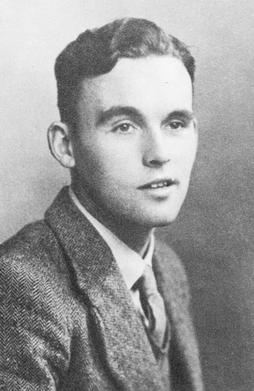Alun Lewis (poet) facts for kids
Quick facts for kids
Alun Lewis
|
|
|---|---|
 |
|
| Born | 1 July 1915 Cwmaman, Wales |
| Died | 5 March 1944 (aged 28) Burma |
| Occupation | Writer, teacher, soldier |
| Nationality | Welsh |
| Period | 1942–1944 |
| Notable works |
|
| Spouse |
Gweno Lewis
(m. 1941, death) |
Alun Lewis (born July 1, 1915 – died March 5, 1944) was a famous Welsh poet. He is known as one of the most important English-speaking war poets of World War II. His poems often explored feelings of being alone and thoughts about life and death.
Contents
Early Life and Education
Alun Lewis was born on July 1, 1915, in Cwmaman, a village near Aberdare in Wales. His parents, Thomas John and Gwladys Lewis, were both school teachers. He had a younger sister named Mair and two brothers.
From a young age, Alun was very interested in writing. He won a scholarship to attend Cowbridge Grammar School. Later, he continued his studies at Aberystwyth University and the University of Manchester. Even though he was born in Wales, he chose to write all his poems and stories in English.
Becoming a Writer and Soldier
After finishing his studies, Alun Lewis tried working as a journalist, but it didn't work out. So, he became a supply teacher, filling in for other teachers. In 1939, he met Gweno Meverid Ellis, who was also a teacher. They got married on July 5, 1941.
When World War II began, Alun Lewis joined the British Army. He first joined the Royal Engineers. He was a pacifist, meaning he believed in peace and was against war. However, he still wanted to fight against fascism, which was a dangerous political idea at the time. Later, he decided to join an infantry battalion as an officer.
In 1942, Alun Lewis published his first book of poems, called Raider's Dawn and other poems. This was followed by a book of short stories, The Last Inspection, in the same year. Later in 1942, he was sent to India with his army unit, the 6th battalion South Wales Borderers.
Poetry and War Experiences
Alun Lewis's poems often talked about his experiences as a soldier. They showed his deep thoughts about army life. He tried to find meaning in the difficult and lonely times he faced during the war.
Many experts have noticed that his work was influenced by another famous poet, Edward Thomas. Alun Lewis even wrote a poem called "To Edward Thomas" as a tribute to him.
His Final Days
Alun Lewis died on March 5, 1944, during the Burma campaign. This was a series of battles against the Imperial Japanese Army in Burma. He was found with a gunshot wound and passed away a few hours later. He is buried at Taukkyan War Cemetery.
After his death, more of his writings were published. His second book of poems, Ha! Ha! Among the Trumpets. Poems in Transit, came out in 1945. His Letters from India were published in 1946. Many other collections of his poems, letters, and stories have been released since then.
Published Works
- Raiders' Dawn and other poems (1942)
- The Last Inspection and other stories (1942)
Works Published After His Death
- Ha! Ha! Among the Trumpets. Poems in Transit (1945)
- Letters from India, edited by Gweno Lewis & Gwyn Jones (1946)
- In the Green Tree (letters & stories) (1948)
- Selected Poetry and Prose, edited by Ian Hamilton (1966)
- Selected Poems of Alun Lewis, edited by Jeremy Hooker and Gweno Lewis (1981)
- Alun Lewis. A Miscellany of His Writings, edited by John Pikoulis (1982)
- Letters to My Wife, edited by Gweno Lewis (Seren Books: 1989)
- Collected Stories, edited by Cary Archard (Seren Books, 1990)
- Collected Poems, edited by Cary Archard (Seren Books, 1994)
- A Cypress Walk. Letters to 'Frieda', with a memoir by Freda Aykroyd (Enitharmon Press, 2006)
Books About Alun Lewis
- Alun Lewis. A Life by John Pikoulis (Seren Books, 1991)
- Poet in Khaki: Alun Lewis and his Combat Writings by Pinaki Roy, War, Literature and the Arts, Vol. 24, No. 1, 2012–13: Wayback Machine
 | Sharif Bey |
 | Hale Woodruff |
 | Richmond Barthé |
 | Purvis Young |

